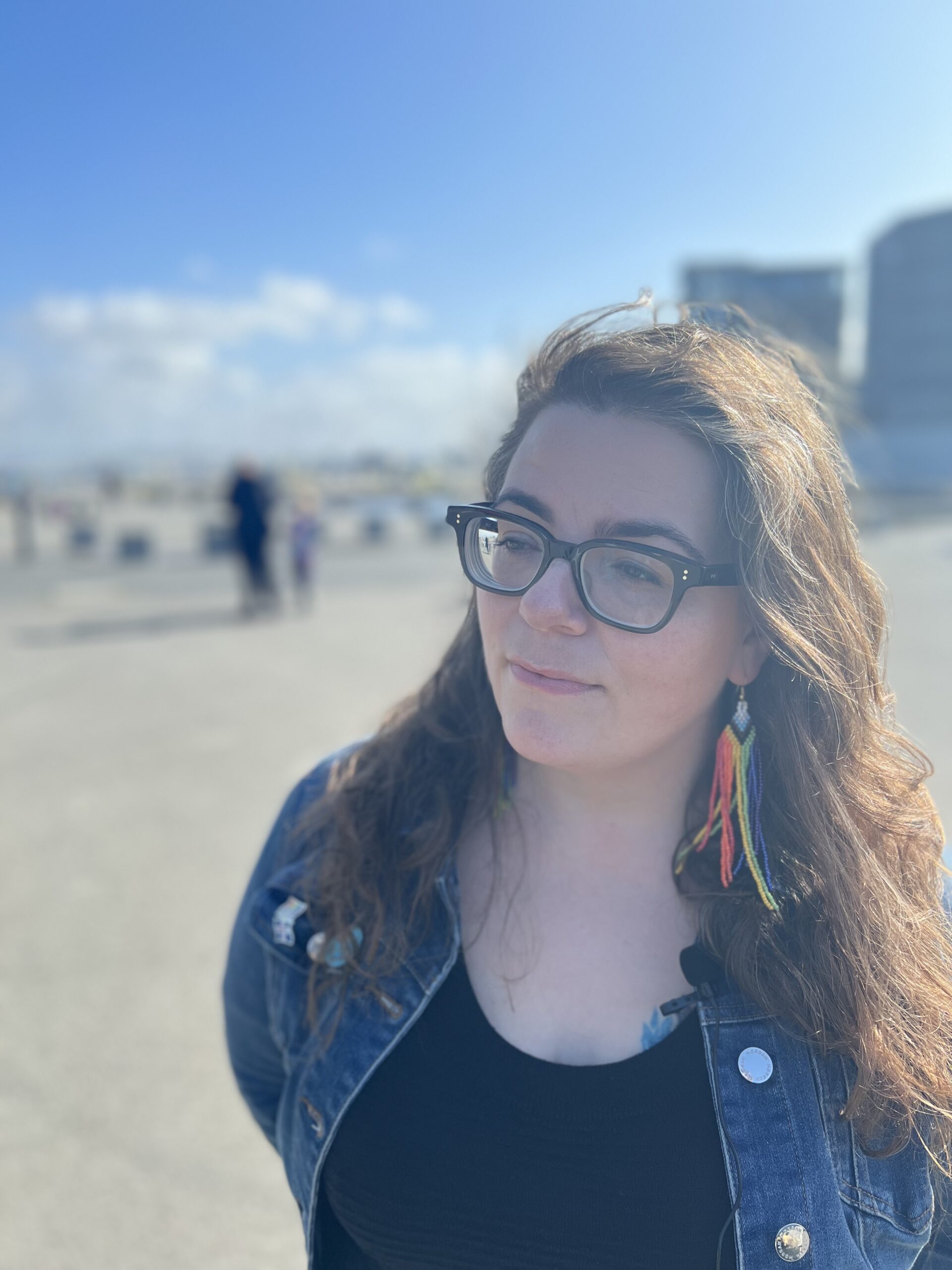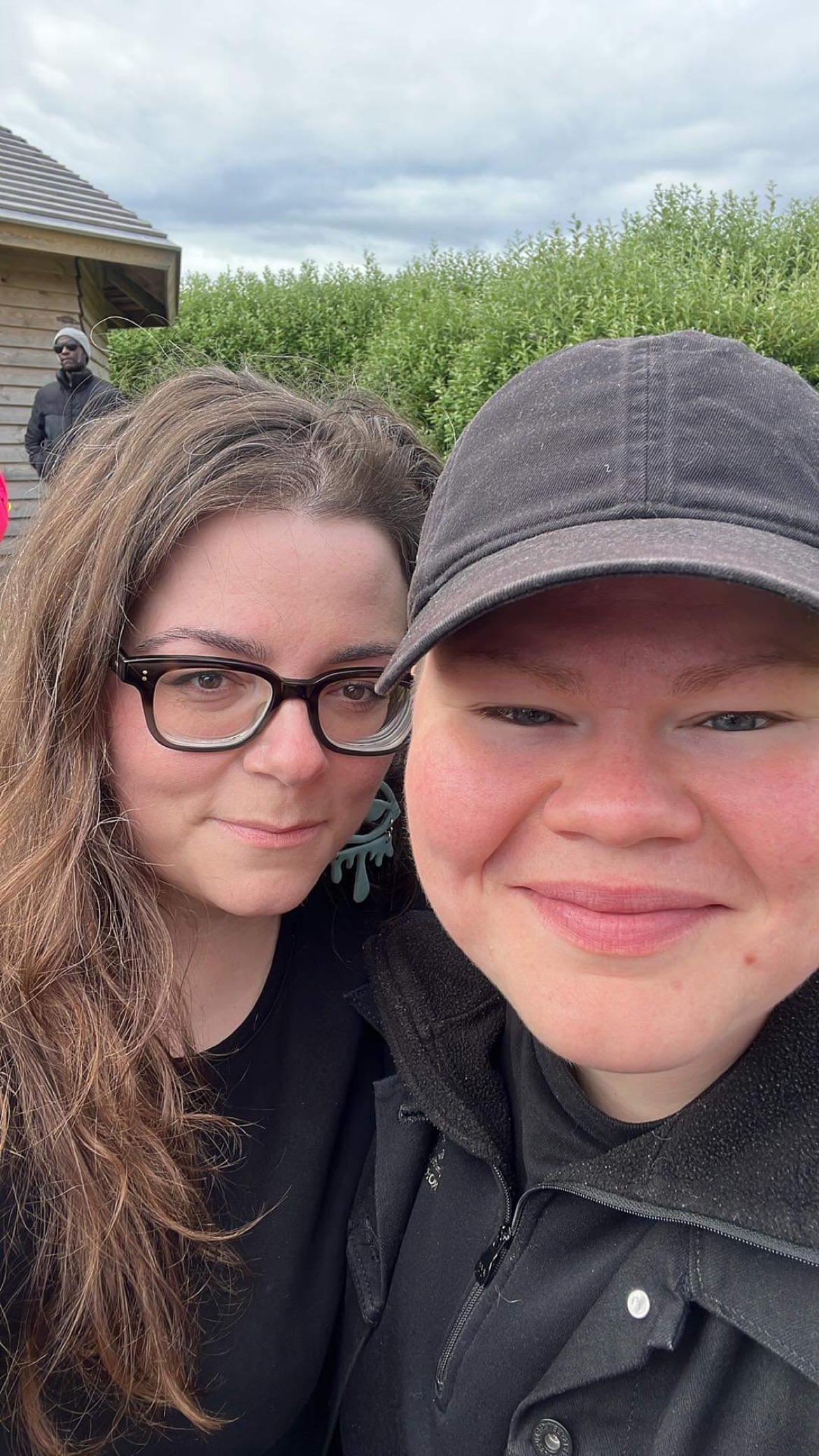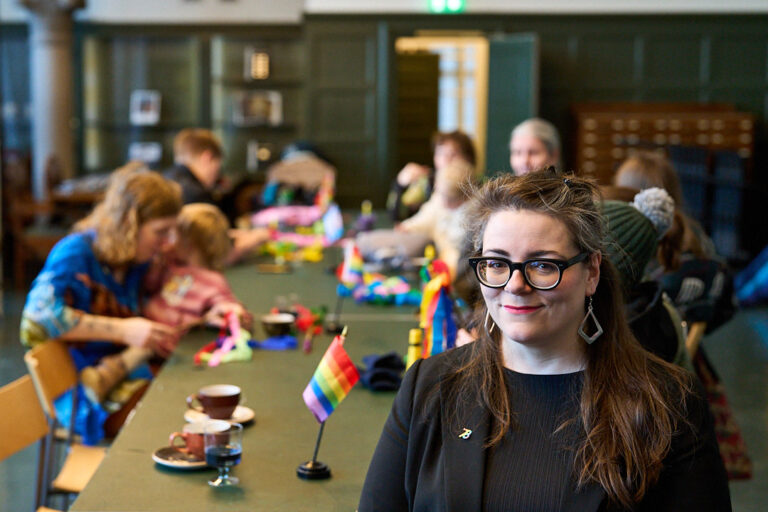Chair of the National Queer Organisation of Iceland (Samtökin ’78) Bjarndís Helga Tómasdóttir on celebrating Iceland’s progress in the queer rights struggle, facing challenges head on, and the importance of defending the progress made.
On a cold winter afternoon, I rang the doorbell of the National Queer Organization’s headquarters in downtown Reykjavík. The door was opened by Bjarndís Helga Tómasdóttir, the organization’s newest chairperson, who took on the role last March. She welcomed me warmly into the cozy front room, where we sat down to talk about her journey within the organization, its ongoing work, and the changes and challenges it’s currently tackling.
Difficult but never dull

When Bjarndís first visited the National Queer Organization (Samtökin ’78) back in the late 1990s, she herself did not initially receive a warm welcome. “It was around 1998. I came and had a conversation with someone, and I got the very clear message that Samtökin ’78 was not for someone like me, someone bisexual. So I left.” It wasn’t until years later that she found her way back to the organization, which had become more inclusive in the meantime. “During university, I went to a party where I talked to a woman I had recently met, a lesbian. For some reason I told her about going to Samtökin ’78 and being turned away. I told it like it was a funny story, but she didn’t find it funny at all. She was the first person who truly welcomed me and told me: You being bisexual is enough.”
That same woman was on the board of the Reykjavík Pride Festival at the time and asked Bjarndís if she was up for organizing an event during the festival. “I remember asking myself if I was allowed to do it, but I said yes and that was how I came into the community.” Organizing led to sitting on a National Queer Organization committee, which led to being a board member, vice-chair, and finally chairperson in March 2024. “I wasn’t sure that I wanted to run for chairperson. I felt it was a project worth doing and I wanted to give the organization and the community everything that I possibly could, but I still asked myself whether I was the right person for the job and whether I was ready for it. I also asked other people for input.”
One essential quality that Bjarndís does have is a love of the job. “It’s so fun to be here! It’s great to meet with people, to have the opportunity to participate in projects and shape them. The people here are so fun: the staff, the volunteers, the clients. They’re a diverse group, funny, and brilliant. This is often a difficult job, but it’s never dull.”
What’s really important is that we don’t drop the ball. We know that it’s possible to take people’s rights away. We’re seeing it in the US, we’re seeing it in the UK, we’re seeing it everywhere.
Queer rights backlash
The main difficulty Bjarndís refers to is the ongoing backlash when it comes to queer rights. Samtökin ’78 has seen an increase in reports of hate speech, harassment, and violence in the last few years. “We see the backlash very clearly,” Bjarndís remarks. “And it can be challenging to have to debate things we didn’t think we had to debate anymore.” Within those debates the discourse has also shifted, as Bjarndís points out. “I was looking through some old screenshots on my computer recently and I saw one I had made of a comment on Facebook around three years ago. I remembered that I had been so shocked about it at the time, that someone was talking about queer people in that way. Now, we see those kinds of comments all the time. The limits of what is permissible to say have shifted.”
Bjarndís says it’s important for all of society to take part in the conversation and address prejudiced comments and jokes. The National Queer Organization has been holding counterspeech workshops, a tactic for responding to hate speech and misinformation. “People often stop themselves from speaking up because they don’t think they know enough about an issue or they don’t have the confidence to enter the conversation, so it’s helpful to have tools for doing so.”
Numbers needed
Besides fighting back against the shift in discourse, Bjarndís says Iceland needs to fund and carry out more studies focusing on the queer community. “Recent studies show that the well-being of queer youth is worse that than of their peers,” she points out. “Recent figures on intimate partner violence are also not great where queer people are concerned. More research would help us know not only where support is most needed but also how to respond.”

One group in particular that the organization sees a growing need to help are older queer people and queer seniors. “For the first time in Icelandic history, we have seniors who have lived their whole lives out of the closet. They participated in founding this organization, they took part in the struggle, they made sure we got all of these rights. Some of those people are now moving into nursing homes and are all of a sudden living with the people who used to bully them. They feel like they have to go back in the closet.”
Bjarndís underlines that the fight for human rights is still the National Queer Organization’s main focus. The country ranks second on the Rainbow Map of Europe but its score of 83% shows there is still plenty of room for improvement. Iceland’s November election saw major shifts in the parties in parliament and the incoming government has yet to articulate how it will support the organization’s crucial work.
It’s culture that nourishes us, that drives us. It’s through culture that we create community.
Government support over the past seven years has helped the National Queer Organization professionalize its operations and increase its full-time staff from one to six. The Left-Green Party, which headed the last governing coalition, was a staunch supporter of the National Queer Organization, according to Bjarndís. It did not win a single seat in parliament in the November election. “Although we still don’t know how the next government will conduct affairs, we have no reason to expect anything other than continued or increased support for the National Queer Organization,” she says, adding that one of the parties in the new coalition, the Reform Party (Viðreisn), has been very vocal about their support.
Looking for a new home
The support the organization has enjoyed in recent years has helped it grow and develop its services – so much so that its operations have outgrown its current headquarters on Suðurgata street, which it has now put up for sale. The organization is hoping to find a new home and move into it by next spring. “Our facilities are really important. We’re doing human rights work, but we’re also providing services, counselling, and workshops, and it’s also a community space,” Bjarndís explains. “This building has served us well in recent years but now there’s more demand for a social space. We need a place where we could open a café, where we could hold events. More space for meeting up and being together.”
In order to relocate, however, the National Queer Organization will need support from the community. “It’s a huge undertaking to move an organisation like this and adapt new facilities so they serve our needs. We will definitely be asking the community for help.” Bjarndís explains that a lot of the funding that the organization receives is through service contracts. “We get funding and are required to use it to provide specific services, so it’s not just money in our bank.”
Protecting progress
In three years, Samtökin ’78 will turn 50. Bjarndís says it’s a perfect time for the organization to showcase what it has achieved in half a century of struggle. The organization itself has grown and matured dramatically in that time. “People need to be aware that this organization is nearly 50 years old and that there is a lot of knowledge here,” Bjarndís points out. “The people working here are professionally educated, and so are all of our counsellors.”
While in the coming years, Bjarndís sees an opportunity to look back and celebrate the organization’s progress, she say the most important thing is staying focused on defending our rights and keep pushing forward. “What’s really important is that we don’t drop the ball. We know that it’s possible to take people’s rights away. We’re seeing it in the US, we’re seeing it in the UK, we’re seeing it everywhere. And we can’t drop the ball here. We can’t just let ourselves believe that the battle is won. That’s crucial, especially in a society where there are people who profit from creating division and fear.”
Coming into the queer community changed everything for me. […] I belong in a way that I had never belonged anywhere else.
According to Bjarndís, though, continued activism goes hand in hand with celebrating queer culture. “It’s culture that nourishes us, that drives us. It’s through culture that we create community.” That community is what gives Bjarndís strength to continue the fight, she says. And she knows on a personal level what a difference it makes. “Coming into the queer community changed everything for me. I felt what I think a lot of us have felt. That here, I’m not the odd one out. I belong in a way that I had never belonged anywhere else.”


